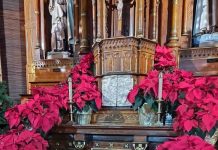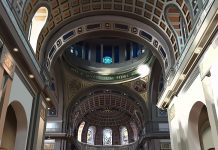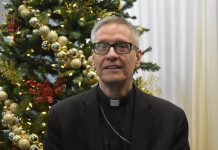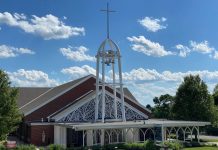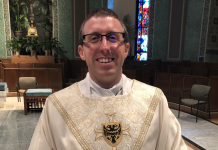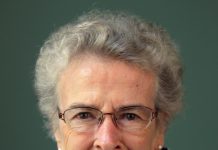
By Junno Arocho Esteves
VATICAN CITY (CNS) — As the Italian government imposed new restrictions to prevent the further spread of COVID-19, the Italian bishops’ conference said churches will remain open for prayer and for Masses with the public.
Vincenzo Corrado, the bishops’ director of communications, said Nov. 5 that the new restrictions signed by Italian Prime Minister Giuseppe Conte allow for “access to places of worship,” as long as social distancing measures are observed to avoid crowding.
While other countries in Europe have announced new lockdowns as infections continue to rise, Conte has resisted implementing a second nationwide lockdown. The measures he announced Nov. 3 include a nationwide curfew from 10 p.m. to 5 a.m., closing shopping centers over the weekend, the total closure of museums, movie theaters and gyms, and online classes for high school students.
Additional lockdown measures are based on a new three-tiered system that divides the country into zones — yellow, orange and red — depending on the level of contagion.
Four Italian regions — Lombardy, Piedmont, Calabria and Valle d’Aosta — have been labeled red zones. Citizens in red zone areas cannot travel between regions and can only leave their homes for work, school, health or other essential reasons.
However, unlike the nationwide lockdown in the spring, churches, hairdressers and public parks will remain open, while restaurants can make deliveries until the curfew time.
Catholics who wish attend Mass or pray in churches in red zone areas are required to fill out the government issued self-certification form, the Italian bishops’ conference said. However, “conscious prudence” should be observed regarding pastoral activities such as catechism classes.
The Italian bishops’ conference recommended that the “protocols indicated by the authorities should be applied” and encourage the use of digital technology for continuing those pastoral activities that can be carried out remotely.
Elsewhere, France’s highest administrative court has rejected a lawsuit by the French Catholic bishops’ conference against a ban on church services. The bishops argued that the lockdown, instituted Oct. 29, was “an attack on religious freedom.”
“The judge has ruled that religious freedom, exercised individually and collectively, is fundamental, and has rejected our petition solely on sanitary grounds,” Archbishop Eric de Moulins-Beaufort of Reims, chairman of the conference’s permanent council, said in a Nov. 7 statement.
“We will remain vigilant toward any limitation on religious liberty, at a time when, for security reasons, the public authorities seek to tighten surveillance of all religions. Above all, the bishops deplore that the faithful thus remain unable to participate in the Mass, the summit of their faith.”
Church leaders in Britain and other countries also questioned new restrictions on public worship.
British church leaders called on Catholics to use churches as “sources of solace and hope,” after challenging a similar ban, in force beginning Nov. 5.
“Despite profound misgivings, it is important that we, as responsible citizens, observe these regulations, which have the force of law,” Cardinal Vincent Nichols of Westminster and Archbishop Malcolm McMahon of Liverpool said Nov. 4 in a statement.
“These regulations are not an attack on religious belief. However, they do demonstrate a fundamental lack of understanding of the essential contribution made by faith communities to the well-being, resilience and health of our society,” the prelates said.
Many European countries have reintroduced widespread restrictions on public gatherings in a bid to control a new spike in reports of COVID-19, the illness caused by the coronavirus.
In Germany and Austria, church leaders welcomed government decisions not to renew restrictions on attendance at church services.
However, bishops in Portugal criticized the government for restricting Masses and pilgrimages to the Marian sanctuary of Fatima, while allowing sports and political meetings.
And the bishops’ conference of Slovakia accused government regulators of ignoring Catholic complaints and demanded a “blanket ban” on services be lifted.


